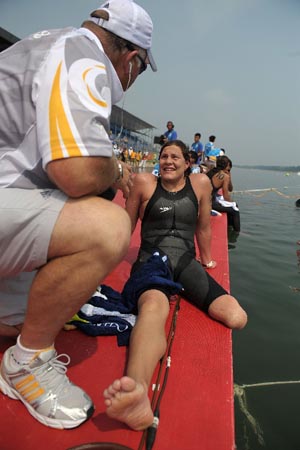For the often critical journalists, they rarely give applause to anyone. But they did Wednesday to South African Natalie du Toit.
Du Toit, 24, is the first female amputee to compete in the Olympics.
|

|
|
Du Toit (R), 24, is the first female amputee to compete in the Olympics.
|
As the exhausted girl was receiving message after finishing 16th in a grueling 10-kilometer open water race, nearly 100 journalists waited patiently for her at the press room. Before du Toit emerged, questions on her were poured to her competitors.
"I think she deserved a separate gold medal just for the effort," winner of the race, Russia's Larisa Ilchenko, said. "It takes a lot of willpower to compete in this discipline. I want to compliment her for being so strong and so brave."
Starting swimming at the age of six, du Toit nearly qualified for the 2000 Games at the age of 16. But the following year as she trained for the 2004 Olympics, she was struck by a car while on her motorbike in Cape Town. Her left leg was amputated at the knee.
Du Toit responded to the tragedy by jumping back in the pool a few months later. She had never been a distance swimmer before the accident, but a year ago she started training for the race. She qualified for the Beijing Games with a fourth-place finish at the open-water world championships in May in Spain.
When du Toit finally appeared in front of the media, she looked tired but happy. "For me it was a dream come true," said she.
The open-water event is slated to the 2008 Olympic Games for the first time. The event is often referred to as a "wrestling match in water" due to the aggressive techniques employed in competing in the sport.
One significant difference between du Toit and the other swimmers is that she has to make sure that someone takes care of her prosthetic leg at the start and return it to her at the finish. Except for that, as an amputee competing with able-bodied people, du Toit received no more courtliness.
"There was lots of dunking. It's always going to be dangerous, the best thing is not to panic, and then keep coming back," she said. The South African stayed in the first pack during the three quarters of the race, but dropped behind at the last stage.